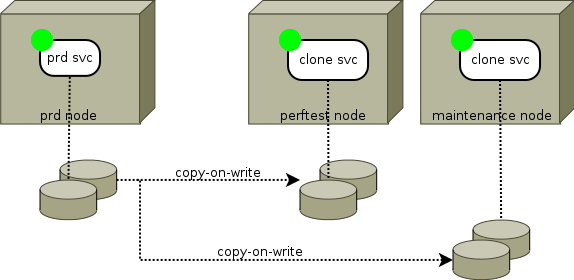IBM DS flash copy¶
Introduction¶

IBM Flash copy allow multi-target block device replication. After create initial flash copy, the relation can persist. These features allow opensvc to drive services using a flash copy device set. Such services are often used for maintenance, pre-production and performance testing environments, where the source device set is used for production. The following documentation presents the configuration of such a service.
A service with only flash copy sync resources can be defined to drive the clone of other servers, just for the benefit of centralized logging and scheduling.
Command set¶
- syncresync
- Resyncflash (or rmflash/mkflash) action to pair source/target. This command verifies the service is down before proceeding.
- syncresync --force
- Bypass the sync_min_delay protection.
Status¶
- up
- The last resync occured less than 'sync_max_delay' minutes ago.
- warn
- The last replication occured more than ‘sync_max_delay’ minutes ago.
- Device are in a unexpected state or not present in the flash copy persistent pair list.
Service configuration¶
Pre-requisites¶
The dscli commands must be installed in the standard location on the nodes running this service resource type.
An <OSVCETC>/auth.conf must exist and contain credentials to access the manager for each array. The agent enforce this file permissions is 600 and is owned by root.
Example auth.conf:
[IBM.XXXX-XXXXXXX]
type = ibmds
hmc1 = 10.10.10.10
hmc2 =
username = opensvc
Use dscli commands to create pwfile in <OSVCVAR>. The pwfile's name must be the same as the array. For exemple <OSVCVAR>/IBM.XXXX-XXXXXXX.pwfile.
Example:
dscli managepwfile -action add -mc1 1.2.3.4 -mc2 1.2.3.5
-pwfile /var/lib/opensvc/IBM.2107-00AAA00.pwfile
-name opensvc -pw xxx
Service configuration file¶
#
# IBM flash copy
#
;[sync#1]
;type = ibmdssnap
;sync_max_delay = 10512000
#
# 'array'
# mandatory. The name of the IBM storage array, as seen by the manager.
# Also used in etc/auth.conf
#
;array = IBM.XXXX-XXXXXXX
#
# ‘pairs’
# mandatory. whitespace-separated list of device pairs (source/target) to drive with this ressource.
#
;pairs = 0001:0002 0101:0102 0003:0004
#
# ‘bgcopy’
# optional. Default True.
# After background copy, all track are available to the target.
# If False, array wait write on source track to copy delta on the target. In this case, read a no copied track on the target is read on the source.
;bgcopy = true
#
# ‘recording’
# optional. Default True. The recording target allow resyncs delta-based and restore delta only. One recording target is possible.
#
;recording = true
# flash copy with recording and bgcopy options looks like delta-based clone feature
# flash copy without recording and bgcopy options looks like snapshot feature
# flash copy without recording option but with bgcopy option looks like full copy feature
You can setup as many sync resources as needed to ensure a consistent replication scenario.
IBM DS flash copy configuration¶
You have to create the persistent flash copy manually once. This requires two existing devices.
Examples¶
Resync a started service snapshots¶
# svcmgr -s iiststibmds stop && \
svcmgr -s iiststibmds syncresync && \
svcmgr -s iiststibmds start
Resync a stopped service snapshots¶
# svcmgr -s iiststibmds syncresync
2014-09-18 23:04:02,189 - IISTSTIBMDS.SYNC#1 - INFO - resyncflash - dev IBM.XXXX-XXXXXXX -persist -record -cp 0001:0002 0101:0102 0003:0004 | /opt/ibm/dscli/dscli -hmc1 10.10.10.10 -user opensvc -pwfile /var/lib/opensvc/IBM.XXXX-XXXXXXX.pwfile
2014-09-18 23:04:05,621 - IISTSTIBMDS.SYNC#1 - INFO - Date/Time: September 18, 2014 11:04:04 PM CEST IBM DSCLI Version: 7.7.10.317 DS: IBM.XXXX-XXXXXXX
Date/Time: September 18, 2014 11:04:04 PM CEST IBM DSCLI Version: 7.7.10.317 DS: IBM.XXXX-XXXXXXX
CMUC00168I resyncflash: FlashCopy volume pair 0001:0002 successfully resynchronized.
CMUC00168I resyncflash: FlashCopy volume pair 0101:0102 successfully resynchronized.
CMUC00168I resyncflash: FlashCopy volume pair 0003:0004 successfully resynchronized.